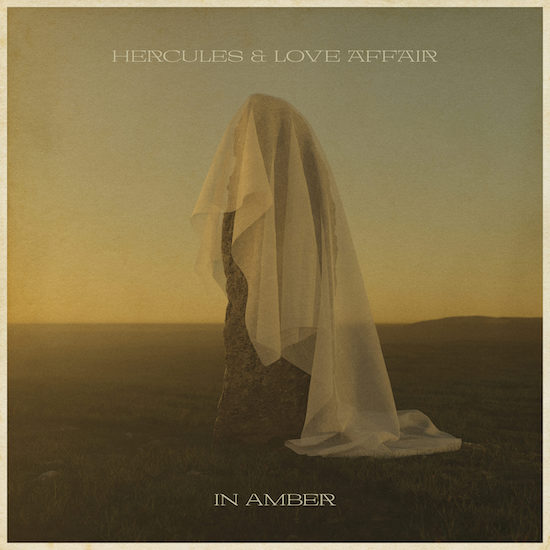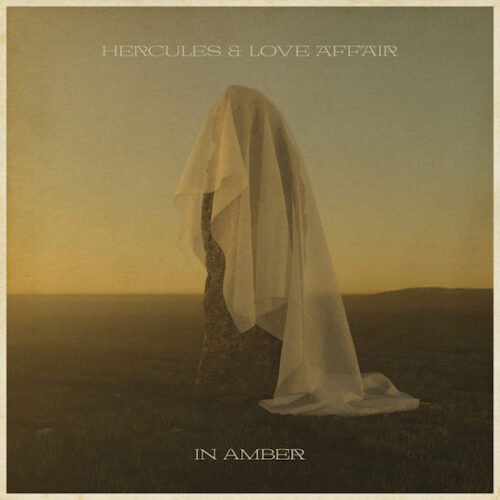It’s been fourteen years since Colorado-born DJ Andy Butler introduced his Hercules & Love Affair project with the irresistible debut single, ‘Blind’. One of those magic-in-a-bottle songs that shone like the fluorescent shades of yellows, blues and pinks illuminating a dance floor in a downtown disco. A perfect stage to sashay away the turmoil of one’s blues on a Saturday night. Omnipresent for the remainder of the aughts and into the tens, ‘Blind’s’ buoyant bass riff transplanted from the 70s, Club Tropicana-like percussion and, of course, Anohni’s extraordinary vocals gave the song an otherworldly quality. In many ways, ‘Blind’ with its unrelenting beat and spellbinding vocalist became the ‘I Feel Love’ for its new generation. A timeless classic.
The fluorescence of that single, and subsequent self-titled debut from 2008, has been replaced by grey-scaled timbres, ominous beats and scorched synth and guitar tones to create a world that commands stillness from its audience when absorbing the atmosphere. Now happily residing in Ghent, Butler closes a five year gap between albums with a masterful turn with In Amber. It’s the most musically stark and affecting work of his career. Adopting a far more somber tempo than his usual infectious dance numbers, Butler summons a gothic air which permeates the record and heightens the darkness underpinning much of the work. With this new record, which has taken longer to make than previous Hercules & Love Affair releases, Butler explained that he wanted to explore themes atypical of dance music. Furthermore, describing the inspiration for In Amber, Butler told tQ recently
, “We’re dealing with mortality on the personal and immediate level, but also facing a crisis on a global scale and staring annihilation in the face in multiple ways.”
This annihilation is felt physically and emotionally across the lyricism. Sins of the parents dominate two of the record’s most arresting songs with regards to their detailed imagery and introspection, respectively. The heart aches on ‘Gates of Separation’: “Mother march with me by my side for I am truly petrified / Those gates we see, they clearly mean separation,” Butler intones over a softly looped piano melody. Later in the song, as a mournful string accompaniment intensifies the melancholy of the protagonist’s misled optimism, “But I trust you, mother / That we’re going home”. A medieval influence on ‘The Eyes of the Father’s’ instrumentation is aurally compelling but doesn’t distract from its quest to confront emotionally repressed patriarchal figures: “Do your sins weigh heavy on your mind / Or do you will them all away?” There’s closure to these parental misgivings on the aptly titled closing track, ‘Repent’. Opening with crackling recordings of a young child and a mother, the arrangement evolves sonically and spiritually with the repeated call and response that takes us into the final moments of the album: “Let them go / I’ll release my grip”.
The dismantling of familial relationships is crucial to the record. It helps us understand the vulnerability in lines like “This body is a place that has never been loved” on ‘Contempt For You’. Butler has devoted his focus on building this overarching narrative with great universality and timelessness in its delivery. There are numerous occasions where the arrangements are based around looped melodies and repeated refrains. This is certainly a reflection of the cyclical nature of family structures. Here, it’s evident that Butler is exorcising harmful patterns and behaviours of his formative years. But there are moments of hope and beauty nestled into the work, too. The intensity of the lyrical themes and sonic tension are momentarily broken with liminal string sections and soft instrumentation. It’s a wonderfully dexterous and developed body of work that gives more of itself with each listen.
Musically, there’s a wealth of sophistication in the spacious arrangements. There’s a richness to the timbres that play central roles in the compositions such as the full-bodied throbbing beat and harpsichord glisten on the ashen ‘You’ve Won This War’, on which Butler sings. His cadence here, and on ‘The Eyes of the Father’, bears a striking likeness to Ian McCulloch, while there’s a Bowie-like inflection to his higher register on ‘Gates of Separation’. Other moments that draw the listener’s ear in are the alluring Cure tones emanating within ‘Grace’ and ‘Gates of Separation’. Tonally, ‘Poisonous Storyteller’, is a Frankenstein’s monster of Portishead’s ‘Machine Gun’, the aggression laced across Yeezus, and classic metal guitar riffs which perfectly serve Anohni’s ethereal register as she sings about “dystopian ecstasies”. As is the case with all of the songs from In Amber, this is an immediately enveloping composition which retains its power after countless listens.
As one would expect with a Hercules & Love Affair record, Butler has brought together a stellar cast of collaborators. The presence of Anohni (recording with Butler for the first time since 2008) on a number of the songs effortlessly brings great energy and drama to ‘Christian Prayers’ and ‘Contempt For You’. On the former, her delivery of the line, “Don’t call heaven when I’m passing / Let me sleep inside the dirt, let me rot” is unshakable. Elsewhere, the extraordinary hook elevating ‘One’ is a perfect companion for Anohni’s idiosyncratic cadence. Its infectious sensibilities make it feel like a sequel to ‘Blind’. On Anohni’s advice, Budgie (Siouxsie & The Banshees) contributes impactful beats to the songs, while Icelandic artist Elin Ey’s vocals on ‘Dissociation’ add to the dynamism to the record whilst sitting neatly between Butler and Anohni.
An exceptional return from Butler, In Amber is exhilarating in its experimentation. There’s no doubt this will be held in high regard with Hercules & Love Affair fans, and will continue to be adored by younger generations in years to come, too.





